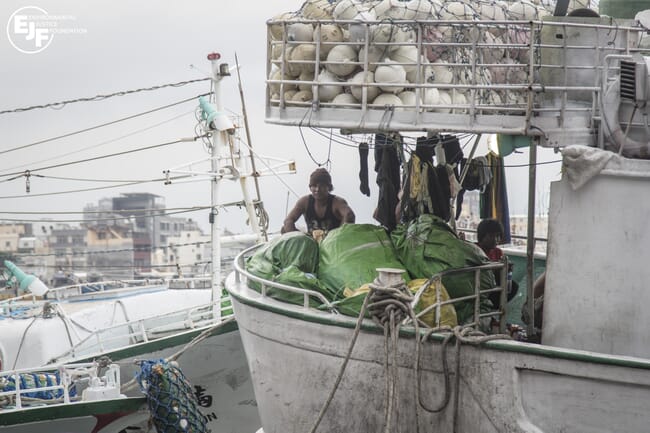A new film by the Environmental Justice Foundation (EJF) tells the harrowing stories of these migrant labourers, exposing the fact that, although some new rules have been introduced in Taipei, human rights abuses and illegal fishing practices continue.
Taiwan is a major supplier of seafood to the world, shipping annual exports worth around US$2 billion to Europe, USA, Japan, and other major economies.
A vast fleet of almost 1,800 distant water vessels with Taiwanese flags operate across the world’s oceans, and hundreds more are owned by Taiwanese nationals but fly ‘flags of convenience’ of other states with even more lax regulations.
EJF interviewed dozens of migrant fishermen who have worked aboard Taiwanese fishing vessels, operating both in national waters and across the world. The fishermen, who hail mainly from Indonesia and the Philippines, reported violence, abuse and threats; squalid conditions and heavy financial deductions for food, travel, medical checks and accommodation; and working long hours, in unsafe and inhumane conditions, for little or no money.
One man, who worked on a Taiwanese-owned vessel that frequently changed its name and flag, tells of seeing his friend being dragged to the boss’s office ashore and held at gunpoint while being beaten by three men. All for working too slowly.
“My friend was hit many times. They also beat him with a sword, not chopping, but hitting. He had a gun pointed at him. I wanted to say something, I took a step forward, but the sword was already there. The boss and his bodyguards wanted to attack me too, but I was pulled back by my captain, who said: ‘This one was not involved.’”
The men also reported being underpaid or not paid at all, and having to work as slaves. “I worked [on the ships] to earn money, but I went home empty-handed,” says one fisherman despondently. “I asked for consul’s help [to get my wages], they didn’t respond. That's all. It would take too long to tell you the whole story.”

© Environmental Justice Federation
Many vessels in the Taiwanese distant water fleet do not return to port for months or even years at a time, simply transferring their catch to another boat out at sea. These long fishing periods allow vessels to exploit marine resources to the maximum, while the extreme isolation on the high seas means that crew are vulnerable to abuse, with no government measures in place to inspect their conditions. Prosecutions for human trafficking in the industry are almost non-existent.
EJF’s Director Steve Trent, says: “The human rights abuses on these vessels are appalling and completely unacceptable. What is more, they underpin illegal fishing that is rapidly destroying the fisheries which millions of people rely on. As one of the world’s most advanced economies, Taiwan has the means and technology to put a stop to these abuses in its fisheries. Taiwanese authorities must empower a single, well-resourced and properly trained agency responsible for protecting migrant crew from human trafficking, and all workers should be protected in line with key International Labour Organization conventions. Unmonitored transfers of catches at sea should also be banned, and maximum trip lengths set.”
Taiwanese politician Lin Shufen also stressed that the Taiwanese government needs to do more to improve fishers’ conditions.
“The Taiwanese government did improve some of the relevant laws,” she says. But warns that they were mainly related to illegal fishing and for regulations on “working conditions, labour rights and human rights, the improvement is very limited.”
“We should not only include [migrant fishers] in the protection, but also put ourselves in their shoes and help to eliminate the human trafficking problem.”


